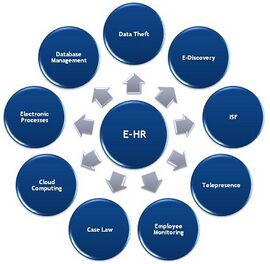Electronic human resources

E-HR is a function of HR that is concerned with the use, management, and regulation of electronic information and processes within an organization.
E-HR is different from E-HRM (Electronic Human Resource Management) and HRIS (Human Resource Information System) which are uses of technology. More specifically, E-HRM is a system that allows management and employees access to human resource related information and services through an organization's intranet or web portal. HRIS refers to enterprise resource planning software that streamlines human resource functions such as payroll.
In contrast, E-HR is a function of human resources that requires cross-functional knowledge and collaboration between multiple departments, most notably human resources and information technology.
Management
The Management aspect of E-HR involves drafting policies and controlling both the traffic and collection of electronic information.
As new technology comes out that is more portable and capable of creating and storing more information, it is the responsibility of HR to define how employees interact with the data. According to a Deloitte study in August 2008, 90% of employer data is electronically stored information (ESI), and 40% of executives say that data volumes are becoming unmanageable. Unmanageable data makes locating relevant data more challenging which can manifest into significant losses through wasted storage space and reductions in productivity. Excessive data volumes is especially troublesome during litigation that requires electronic discovery.
E-HR policies strive to control and organize data within an organization. To accomplish this, effective records management policies must be created to facilitate lean data storage which involves maintaining pertinent information while removing data as it becomes irrelevant.
Regulation
E-HR also involves the regulation of electronic data and processes. This requires employers to monitor employees and establish security measures to prevent employee data theft and misuse of technology. Regulation is a vital component of E-HR because data is considered a form of collateral. Therefore, similar to other capital assets, it becomes a business necessity and fiduciary duty to protect the assets of a company from theft or exploitation.
Today, data theft is known one of the fastest growing white-collar crimes globally. Unfortunately, a significant source of data theft is employees and former employees because they have access to intellectual property stored on company networks. As a result, preventing data theft is a primary concern of E-HR specialists. Good.
Related Case Law
There are numerous legal cases that have increased the need for E-HR over the last decade. As case law is established through hearings the role of human resources with respect to technology will continue to grow to reduce liabilities from future litigation. Below are two cases related to E-HR:
A case from New Jersey[1] demonstrates the need for employers to monitor and discipline employees for misuse of technology. In the case an accounting employee posted nude photographs of his step daughter on the internet from the employer's computer. The mother claimed that the employer knew or should have known that the employee was using company computer systems to view, download and participate in child pornography. The Court stated: “We agree with plaintiff that defendant [the employer] had a duty to report Employee’s activities to the proper authorities and to take effective internal action to stop those activities, whether by termination or some less drastic remedy.” The Court then sent the case back to the lower court for a trial on whether the employer’s action was the cause of the claimed injuries.
The Supreme Court ruled in favor of the California police chief which addressed whether the 4th Amendment's ban on "unreasonable searches" puts any limits on searches by public employers. The court said the limits were minimal, so long as the employer had a "work-related purpose" for inspecting an employee's desk or reading messages sent by the employee on an agency paging system., because it is considered reasonable search.[2] The ruling came was based on a situation where police officers who sued after a wireless provider gave their department transcripts of an officer's text messages. The case is on appeal to the U.S. Supreme Court.
References
- ↑ New Jersey Appellate Court, Jane Doe v. XYC Corporation
- ↑ Savage, David G., LA Times, Supreme Court rules in favor of California police chief who read employee's texts
External links
